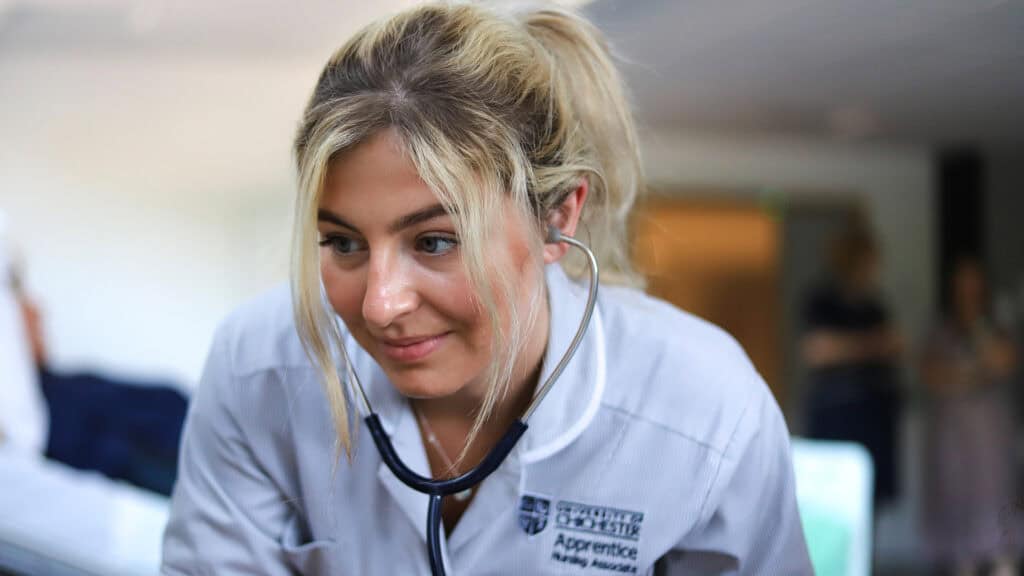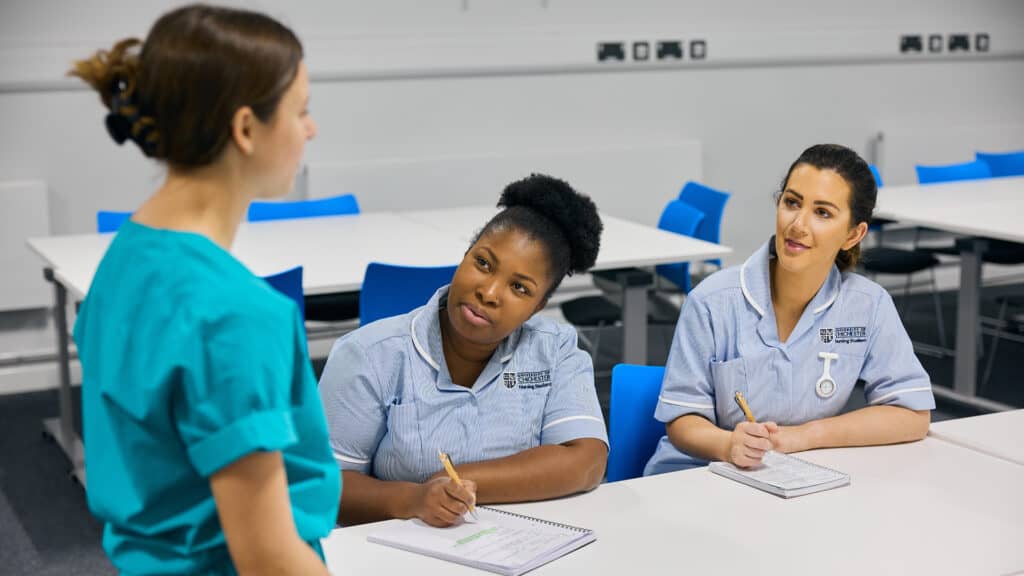100%
positivity for
academic support in Nursing
National Student Survey 2025
Gold
rated university in the Teaching Excellence Framework
TEF 2023
98%
positivity for
learning resources in Nursing
National Student Survey 2025
Join us at one of our Open Days!
Saturday 11 October
Sunday 26 October
Saturday 22 November
Saturday 11 October
Sunday 26 October
Saturday 22 November
Our next Open Day is in:
Overview
Earn as you learn to become a Registered Nurse
Important
Applicants for this course are recruited directly by employers, or are already employed by the NHS, private or voluntary organisation.
This course prepares you for future employment as a registered nurse, as you learn at university alongside a full-time role within a nursing team.
You can work in different areas of nursing in England such as adult, children’s, mental health or working with those with a learning disability.
Registered Nurses provide care that puts the person or people at the centre of the experience
Our Registered Nurse Degree Apprenticeship course sees your academic learning take place at the University or online whilst you spend the majority of your time in your employed role.
You will need to be employed and nominated by your employer before you can commence this course, but you can contact our team who can help you find these roles.
Become a caring and compassionate Registered Nurse
You will learn to care for people who may be vulnerable and require caring activities across the full range of the life span, and the four fields of nursing:
- Adult
- Children
- Mental health
- Learning disability
Throughout the course, you will learn to treat everyone with dignity and humanity, whilst taking responsibility for your own actions.
Finding an employer
Our Nursing Associate Higher Apprenticeship course sees your academic learning take place at the University one day a week, as you spend the other four days in your employed role.
Various local employers advertise these roles. You can contact our team who can help you find these roles before you undertake the course.
Benefit from excellent levels of support
Our commitment to small class sizes coupled with our team of empathetic and experienced teaching staff ensure that all learners benefit from elevated levels of excellent academic and personal support.
Any additional learning needs are identified early to ensure that specific support is put in place, and we provide dedicated sessions for those with neuro-divergency.
Our brand-new facilities offer innovative teaching methods that provide immersive learning experiences and simulation-based learning, allowing you to engage with scenario-based activity using robotic manikins, virtual reality and actors to reflect real situations.
Experiential learning through cutting-edge technology
Our brand-new facilities offer innovative teaching methods that provide immersive learning experiences and simulation-based learning, allowing you to engage with scenario-based activity using robotic manikins, virtual reality and actors to reflect real situations.
Head of School of Nursing and Allied Health Dr Nita Muir has published international research in virtual simulation learning and Senior Lecturer James Wilson is a National Teaching Fellow with expertise in Forum theatre.
A rich history of nursing education
In 1973, the 25-year-old Graylingwell School of Nursing combined with Royal West Sussex and St Richard’s Hospital School of Nursing to form Chichester and Graylingwell School of Nursing, which was responsible for most nurses who practiced in the area before it closed in 1978.
The School of Nursing and Allied Health at the University of Chichester now takes up the mantle to promote and develop nurse education in the local area.
This course is accredited by the Nursing and Midwifery Council.

The Course
Learn at university one day a week alongside your professional role
This course provides you with the required knowledge, skills and values you need to meet the BSc (Hons) Registered Nurse Degree Apprenticeship.
Indicative modules
The following list is indicative and subject to future change.
Year One
- Understanding Person Centred Nursing Care in Practice - Apprenticeship 1
- Introduction to Nursing
- Caring Sciences for Nursing Practice Apprenticeship 1
Year Two
- Developing Person centred Nursing Care in practice - Apprenticeship
- Caring Sciences for Nursing Practice Apprenticeship 2
- Understanding Illness, Pharmacological and Psychosocial Interventions
Year Three
- Autonomous Person Centred Nursing Care in Practice - Apprenticeship
- Caring Sciences for Nursing Practice Apprenticeship 3
- Innovation and Improvement in Nursing Practice
Teaching and Assessment
Feel the support of our expert and experienced staff
Attending university
You will attend university for one day per week and attend your workplace for the other four workdays. During your induction, there will be support for your transition into Higher Education.
Learn from expert and experienced practitioners
You’ll be taught by academics, with many who are registered practitioners from a variety of clinical backgrounds. Healthcare qualifying degrees offer a range of options for future employment both internationally and nationally. Roles can be within emergency care, primary care, end-of-life care and development into becoming advanced practitioners.
Smaller class sizes for better support
Our dedication to smaller class sizes means that our team of expert academic staff get to know you and your needs as an individual.
You will attend classes including lectures, seminars, interprofessional learning, workshops, practical sessions and simulations. You will work collaboratively with other students on the course as well as having service user and carer input.
Learning through work is a recognised learning activity, there will also be dedicated time for you to drive your learning through independent learning and reflection.
Facilities
Experience brand new on-campus facilities that help you thrive
School of Nursing and Allied Health
The School of Nursing and Allied Health is based on the Bishop Otter campus. You will learn both on campus and in a variety of practice and simulation settings.
All learning will be supported by our lecturers in a safe and controlled setting, and by your practice assessors and supervisors in health and social care environments.
Immersive sensory learning technologies
Explore our immersive learning room that recreates sounds and visuals from a range of clinical settings, supported with the latest virtual reality technologies.
Six-bed ward environment
Our six-bed ward environment recreates a hospital setting, allowing you to practice basic nursing skills in a realistic simulated setting.
Robotic mannequins
Our responsive robotic mannequins allow you to simulate a variety of clinical procedures and situations ahead of your placement experiences.
Immersive sensory learning technologies
Experience our immersive learning room that recreates sounds and visuals from a range of clinical settings, supported with the latest virtual reality technologies.
Simulated community nursing settings
Practice your communication skills and managing difficult situations via Forum theatre and with actors in our community flat and GP surgery.
Expert and supportive staff
Our experienced teaching staff include clinicians in practice and are here to support you as you develop into a competent graduate nurse.
Specialist library facilities
You will have access to additional resources available from our partners who support your practice learning, including the specialist library facilities at the local St Richard's Hospital.
Develop your digital competency
Gain critical experience of digital materials such as clinicalskills.net, Electronic Practice Assessment Documents and anatomical software with Hololens technology.
Learning and social hub spaces
Our commitment to a friendly and inclusive student community includes dedicated learning and social spaces within our HealthOne building.
Learning Resource Centre
The Learning Resource Centre (LRC) contains the library, a café, IT/teaching rooms and the Support and Information Zone (SIZ).
Careers
Graduate ready for a career in nursing
As a registered nurse, you’ll have a varied and fulfilling career ahead of you.
Graduate ready for a career in healthcare
As a University of Chichester BSc (Hons) Registered Nurse Degree Apprenticeship graduate, you will demonstrate an elevated level of compassionate leadership, excellent digital literacy skills, resilience and evidence-based knowledge which is person-centred and will prepare you to continue your career in a modern-day nursing workforce.
Become a core part of a healthcare team
Registered nurses are a key part of the multidisciplinary teams that care for patients. You will be at the centre of teams which can include: social workers, doctors, occupational therapists, pharmacists, radiographers, and healthcare assistants. You’ll also work closely with patients’ families and carers.
Open up your career options
After completing your degree apprenticeship, your career progression options are wide and varied. There are opportunities in advanced practice in clinical, research, education and leadership areas.
Potential careers include:
- Community nurse
- Critical care nurse
- Palliative care nurse specialist
- Practice nursing
- Care home manager
- Nurse educator
- Nurse researcher
- Nurse leader
Course Costs
Your employer will pay your tuition fees to the University so you will graduate without tuition fee debt.
As an employee, you will receive your salary from your employer and be eligible for employee benefits while you study. You will not be eligible for a student loan.
To find out about any additional costs on this course, please see our Additional Costs page.
Entry Requirements
Typical offer (individual offers may vary)
You will be required to have the following prior to the course start date:
English Qualification
Mathematics Qualification
UCAS
Recognition of Prior Learning (RPL)
Applicants will be considered on an individual basis in line with the University’s Admissions policy and the Nursing and Midwifery Council Standards and requirements.
Additional requirements
- Health or care experience to demonstrate an insight into the professional values and behaviours associated with health and care environments [desirable].
- Employers are responsible for ensuring apprentices meet occupational health requirements and have passed appropriate vetting procedures, which include a Disclosure and Barring Service Check and right to work check. This is evidenced through the submission of supplementary evidence as part of the selection process.
- The employer must confirm apprentices are able to provide the range of placement experiences required for NMC registration.
- Apprentices will have been identified by the employer as being able to succeed on the programme. Employers may set additional entry requirements as part of the selection process prior to assessment for entry by the University.
- Demonstrate capability for digital and technological literacy.
- Evidence of study within the last five years (not mandatory training).
- Applicants whose first language is not English must demonstrate IELTS 6.5 overall with no less 6.0 in any element (or equivalent level in OET)




